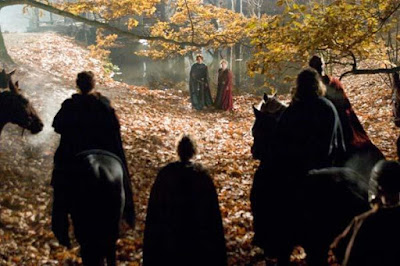Tristan
and Isolde
After the fall of the Roman Empire,
English orphan Tristan meets and falls in love with Irish princess Isolde,
however she is set to marry Lord Marke, who raised Tristan. While unaware of
her identity, he has won her hand in marriage for his lord and future king of
the two countries, but now the passion of the two young people causes a rift
leading to a devastating battle.
***********_______________**********
Tristan
(sometimes called Tristram), the nephew of King Mark of Cornwall, was a symbol
of all the virtues of chivalry, including bravery and honor. Some
accounts also claim that he was a brilliant harp player. According to the most
detailed versions of this legend, the king of Ireland sent a champion named
Morholt to demand tribute from Cornwall, and Tristan fought Morholt in
single combat. Tristan killed Morholt, leaving a broken piece of his sword in the fatal wound. The piece remained
in Morholt's body when it was carried back to Ireland. Morholt had wounded
Tristan as well, and when the wound did not heal, the young knight went to Ireland, in disguise, to seek
help from an Irish princess named Isolde (or Iseult) who was skilled in
healing.
After
Isolde healed Tristan, he lingered at the Irish court for a while. On his
return to Cornwall, he praised Isolde so highly that King Mark resolved to
marry her. Loyal and obedient to his uncle and king, Tristan agreed to return
to Ireland and seek Isolde's hand for Mark.
medieval
relating to the Middle Ages in Europe, a period from about A.D. 500 to 1500
chivalry
rules and customs of
medieval knighthood
tribute
payment made by a
smaller or weaker party to a more powerful one, often under the threat of force
Back
in Ireland, Tristan found that the country was being terrorized by a fearsome
dragon. Tristan succeeded in killing the beast. While Isolde was nursing him
back to health after the fight,
*See
Names and Places at the end of this volume for further information.
she
discovered his broken sword and realized that he was the warrior who had killed
Morholt, her uncle. At first she wanted to avenge her uncle's death. However,
Tristan had endeared himself to the Irish people by killing the dragon, so
Isolde forgave him and agreed to marry King Mark. She set off with Tristan for
Cornwall.
Many
versions of the legend say that Tristan and Isolde had already begun to care
for one another. Their sense of honor might have prevented them from letting
their feelings show, but fate now took a hand. Isolde's mother had prepared a
magical drink for Isolde to share with Mark—a potion that would make them love each other
forever. During the voyage to Cornwall, Isolde and Tristan drank the potion,
not knowing what it was, and fell deeply in love.
Although
Isolde went through with the marriage to Mark, she could not stop loving
Tristan, and he was fated to love her in return. They tried to keep their
passion a secret, but eventually it became known. Some accounts of the story
contain episodes of intrigue and suspense in which King Mark or various knights
try to trap the lovers and obtain proof of their guilt. In the end, Tristan
fled from Cornwall in despair.
By
the 1200s, the legend of Tristan had been interwoven with the Arthurian
legends. Tristan had become a noble knight and appeared in some of the stories
about Arthur, Lancelot, and the knights of the Round Table. By this time,
storytellers had also begun to portray King Mark as cruel or cowardly, perhaps
to create a stronger contrast between Mark and Tristan, though in earlier
versions of the legend, Mark was an honorable man.
Tristan
finally settled in Brittany, where he married another Isolde, known as Isolde
of the White Hands. His love for Isolde of Cornwall had never died, though. In
time Tristan was wounded in battle, and his wife could not cure him. He sent
for Isolde of Cornwall, hoping that she could once again heal him. He requested
that the ship coming back from Cornwall should have white sails if it carried
Isolde and black ones if it did not.
Tristan
lay on his sickbed and waited. Finally the ship appeared on the horizon,
bearing white sails. Too sick to sit up, Tristan asked about the color of the
sails. Jealous of his passion for the first Isolde, his wife lied and said that
they were black. Tristan fell into despair, believing that Isolde had refused
to help him, and died. When Isolde arrived and learned of his death, she too
died of grief. The two were buried in Cornwall. From Isolde's grave a rose tree
grew, and from Tristan's came a vine that wrapped itself around the tree.
Every time the vine was cut, it grew again—a sign that the two lovers could not
be parted in death.
***********_______________**********
Images
The Movie named ,
Tristan + Isolde (2006)







































Can they re-show this movie in cinema again? I really want to know the story
ReplyDelete